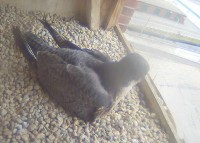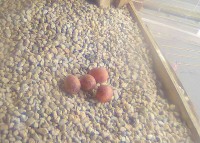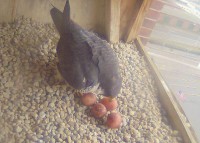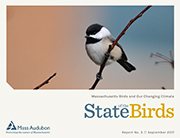Lawrence Peregrines: what happens during incubation?
April 15, 2018 in In the Nest Box, lawrence peregrines, Peregrine Falcons Eastern Massachusetts, Peregrine Falcons Massachusetts
 Another overcast morning in Lawrence with winds from NE at 13MPH, gusts up to 25MPH, and the temp at 35F, but a wind chill at 26F that makes it feel much cooler 35F. Not looking to be such a nice day. A least the wind is from the NE and that leaves the nest box well shielded from string direct wind.
Another overcast morning in Lawrence with winds from NE at 13MPH, gusts up to 25MPH, and the temp at 35F, but a wind chill at 26F that makes it feel much cooler 35F. Not looking to be such a nice day. A least the wind is from the NE and that leaves the nest box well shielded from string direct wind.
The forecast calls for a chance of rain before 7am, then rain likely, possibly mixed with freezing rain between 7am and 8am, then sleet likely after 8am. Cloudy, with a high near 32. Northeast wind 10 to 13 mph, with gusts as high as 26 mph. Chance of precipitation is 70%. Little or no sleet accumulation expected.
 A number of times today, the eggs were left alone for longer stretches of time than is normal. Did not observe a changing of the guard between male and female!
A number of times today, the eggs were left alone for longer stretches of time than is normal. Did not observe a changing of the guard between male and female!
 During the normal course of incubation, one of the adults is nearly always on the nest. Exceptions are during disturbance, for short periods on particularly warm days, or for a few minutes during food exchanges. The female does the majority of incubation. The male brings food to her several times daily, or sometimes simply relieves her and takes a turn on the eggs while the female eats, preens, and relaxes. When she returns to the nest box to relieve the male, he usually is waiting on the outer edge of the nest box. It is often a a challenge to identify the male from he female, as the male’s leg band is not always easy to see. It will be helpful to identify field marks to distinguish the sexes.
During the normal course of incubation, one of the adults is nearly always on the nest. Exceptions are during disturbance, for short periods on particularly warm days, or for a few minutes during food exchanges. The female does the majority of incubation. The male brings food to her several times daily, or sometimes simply relieves her and takes a turn on the eggs while the female eats, preens, and relaxes. When she returns to the nest box to relieve the male, he usually is waiting on the outer edge of the nest box. It is often a a challenge to identify the male from he female, as the male’s leg band is not always easy to see. It will be helpful to identify field marks to distinguish the sexes.
Literature Cited:
Cade, T. J., J. H. Enderson and J. Linthicum. 1996a. Guide to Management of Peregrine Falcons at the eyrie. Boise, ID: The Peregrine Fund, Inc. (Excerpt: Linthicum, Janet. Observing Breeding Behavior)
